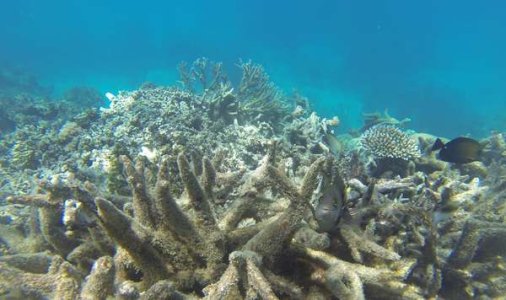Scientists reveal why this summer was a nightmare for the Great Barrier Reef!
By
KenAlunan
- Replies 2
The Great Barrier Reef, one of the world's natural wonders and a treasured Australian icon, has faced a summer of unprecedented challenges.
Scientists have raised the alarm, warning that the reef has experienced its most devastating summer on record, with a series of environmental assaults leaving it in a dire state.
The Great Barrier Reef Marine Park Authority, the Australian Institute of Marine Science, and The Commonwealth Scientific and Industrial Research Organisation have released a 'gut-wrenching' update revealing that almost three-quarters of the reef has been affected by coral bleaching.
This phenomenon is not new to the reef, but the scale and frequency of the bleaching events are increasing at an alarming rate, with this summer marking the fifth mass bleaching in just eight years.
Coral bleaching occurs when corals, stressed by elevated sea temperatures, expel the symbiotic algae (zooxanthellae) that live within their tissues.
These algae provide corals with their vibrant colours and most of their energy. Without them, corals turn white, or 'bleach,' and while they can survive in this state temporarily, prolonged stress can lead to coral death.

There are multiple causes of this summer's severe bleaching.
The reef was battered by two tropical cyclones and severe flooding, compounding the stress on the coral ecosystems.
An outbreak of the coral-munching crown-of-thorns starfish has also wreaked havoc on the reef, devouring vast swathes of coral.
The aerial surveys conducted during the 2023/24 summer update found that 73 per cent of the 1080 reefs monitored had suffered bleaching.
Of these, 39 per cent experienced 'very high' or 'extreme' levels of bleaching, with the southern region and parts of the central and northern areas being the most brutally hit.
Professor Terry Hughes from James Cook University has expressed grave concerns over the shortening gap between bleaching events.
He said, ‘That's nowhere near enough [time] for a full recovery or anything like it.’
The reef's resilience is being tested like never before, and scientists like Professor Hughes and Dr Selina Ward from the University of Queensland are calling for urgent action on climate change to protect this irreplaceable ecosystem.
She said, ‘We really have to get serious ... we're certainly running out of time.’
While the full extent of this summer's impact is yet to be determined, the initial findings suggest that the reef is in a category of distress not previously recorded.
‘It's a very severe and unfortunate bleaching event (after) some of the longest spells of hot water we've ever had on the Great Barrier Reef,’ notes Dr Ward.
Over the next 12 months, scientists will continue to monitor the impact of the record water temperatures on the reef's health.
The recent declaration of a fourth global mass coral bleaching event affecting 53 nations underscores the global nature of this crisis.
The Great Barrier Reef, however, has become one of the most frequently bleached reef systems in the world, raising fears that it could follow in the footsteps of the Caribbean, which has lost 80 per cent of its coral cover.
In response to this crisis, WWF Australia has urged the government to set ambitious federal emissions reduction targets and to phase out fossil fuels.
The future of the Great Barrier Reef hangs in the balance, and the actions taken now will determine whether this natural wonder can be preserved for future generations.
 Many have cherished memories of the Great Barrier Reef, whether from snorkelling adventures, family holidays, or its representation of Australia's natural beauty.
Many have cherished memories of the Great Barrier Reef, whether from snorkelling adventures, family holidays, or its representation of Australia's natural beauty.
It's a stark reminder that the legacy we leave behind for our children and grandchildren is contingent on the choices we make today.
This isn’t some far-off future. Today, tourists are noticing the changes to the Great Barrier Reef.
Have you visited this majestic place? How do you feel about the challenges it's facing? Let us know in the comments below!
Scientists have raised the alarm, warning that the reef has experienced its most devastating summer on record, with a series of environmental assaults leaving it in a dire state.
The Great Barrier Reef Marine Park Authority, the Australian Institute of Marine Science, and The Commonwealth Scientific and Industrial Research Organisation have released a 'gut-wrenching' update revealing that almost three-quarters of the reef has been affected by coral bleaching.
This phenomenon is not new to the reef, but the scale and frequency of the bleaching events are increasing at an alarming rate, with this summer marking the fifth mass bleaching in just eight years.
Coral bleaching occurs when corals, stressed by elevated sea temperatures, expel the symbiotic algae (zooxanthellae) that live within their tissues.
These algae provide corals with their vibrant colours and most of their energy. Without them, corals turn white, or 'bleach,' and while they can survive in this state temporarily, prolonged stress can lead to coral death.

Within the Great Barrier Reef are 2,500 individual reefs of varying sizes and shapes and over 900 islands. Image Source: Shutterstock / Darkydoors
There are multiple causes of this summer's severe bleaching.
The reef was battered by two tropical cyclones and severe flooding, compounding the stress on the coral ecosystems.
An outbreak of the coral-munching crown-of-thorns starfish has also wreaked havoc on the reef, devouring vast swathes of coral.
The aerial surveys conducted during the 2023/24 summer update found that 73 per cent of the 1080 reefs monitored had suffered bleaching.
Of these, 39 per cent experienced 'very high' or 'extreme' levels of bleaching, with the southern region and parts of the central and northern areas being the most brutally hit.
Professor Terry Hughes from James Cook University has expressed grave concerns over the shortening gap between bleaching events.
He said, ‘That's nowhere near enough [time] for a full recovery or anything like it.’
The reef's resilience is being tested like never before, and scientists like Professor Hughes and Dr Selina Ward from the University of Queensland are calling for urgent action on climate change to protect this irreplaceable ecosystem.
She said, ‘We really have to get serious ... we're certainly running out of time.’
While the full extent of this summer's impact is yet to be determined, the initial findings suggest that the reef is in a category of distress not previously recorded.
‘It's a very severe and unfortunate bleaching event (after) some of the longest spells of hot water we've ever had on the Great Barrier Reef,’ notes Dr Ward.
Over the next 12 months, scientists will continue to monitor the impact of the record water temperatures on the reef's health.
The recent declaration of a fourth global mass coral bleaching event affecting 53 nations underscores the global nature of this crisis.
The Great Barrier Reef, however, has become one of the most frequently bleached reef systems in the world, raising fears that it could follow in the footsteps of the Caribbean, which has lost 80 per cent of its coral cover.
In response to this crisis, WWF Australia has urged the government to set ambitious federal emissions reduction targets and to phase out fossil fuels.
The future of the Great Barrier Reef hangs in the balance, and the actions taken now will determine whether this natural wonder can be preserved for future generations.
Key Takeaways
- The Great Barrier Reef has experienced its most severe summer on record, with extensive coral bleaching coupled with environmental stressors like floods, cyclones, and crown-of-thorns starfish outbreaks.
- Nearly three-quarters of the reef is reported to have been bleached, with scientists expressing concern over the diminished recovery time between bleaching events due to climate change.
- Aerial surveys showed significant bleaching, with 39 per cent of reefs displaying 'very high' or 'extreme' levels, primarily in the southern region and some central and northern areas.
- There is an urgent call from scientists and conservation groups for serious action on climate change to protect the reef, with a push for Australia to commit to substantial emissions reduction and the phasing out of fossil fuels to prevent further damage.
It's a stark reminder that the legacy we leave behind for our children and grandchildren is contingent on the choices we make today.
This isn’t some far-off future. Today, tourists are noticing the changes to the Great Barrier Reef.
Have you visited this majestic place? How do you feel about the challenges it's facing? Let us know in the comments below!








